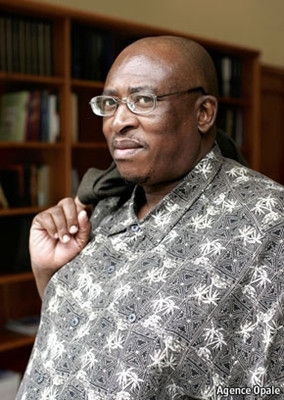(单词翻译:单击)
Books and Arts; Book Review;Post-apartheid South Africa;The rejected son;
文艺;书评;后种族隔离时代的南非;游子被拒在外;
Sometimes There is a Void: Memoirs of an Outsider. By Zakes Mda.
有时候有一种空虚:局外人回忆录;Zakes Mda著。
They “stopped the gravy train just long enough to get on themselves,” said Desmond Tutu in disgust over the post-apartheid greed of South Africa's liberation elite. If Zakes Mda's account is anything to go by, the Nobel laureate was guilty of understatement. The African National Congress (ANC), he claims, is “overtaking Nigeria” in patronage and cronyism.
对南非解放精英在后种族隔离时代的贪婪,戴斯蒙德·图图(Desmond Tutu)气愤地这样说,“他们长时间停下这辆财富之车好让自己上去”。扎克斯·姆达(Zakes Mda)宣称,非洲国民大会在赞助和任人唯亲上已“超过尼日利亚”。如果他的看法有任何参考意义的话,那这位诺贝尔和平奖得主(Desmond Tutu)恐怕低估了情况。

J.M. Coetzee, Christopher Hope, Damon Galgut and other South African writers have also been critical of the country's governing party. But Mr Mda's attack is far more bruising than theirs. Not only is he the country's leading black playwright and novelist; as a member of a prominent family forced to flee apartheid South Africa, and as an angry campaigner during those harsh years, his political credentials are impressive.
J.M. Coetzee, Christopher Hope, Damon Galgut 等其他一些南非的作家都对执政党持批评态度。但是姆达先生的攻击比他们的更加激烈。在本国他是黑人剧作家和小说家的领军人物,当显赫家族被迫逃离种族隔离政策的南非时他是一员,在那些艰难的岁月里他成为一个愤怒的活动家,他的政治立场总是让人印象深刻。
His father, A.P. Mda, was the “founding spirit” of the Pan Africanist Congress of Azania (PAC), which broke with the ANC in 1959 in protest against, among other things, that party's links with the Soviet Union. In political exile Mda senior practised law in Lesotho where, as an austere Christian, he embodied the PAC's motto: “Service, Sacrifice and Suffering”. He charged deserving clients little or nothing for his services and moved his impoverished family into what his son describes as a slummy township. Their house had no electricity, a rusty corrugated iron roof and no ceiling; “the toilet was a pit latrine outside and we had to draw water from a communal tap a few streets away.”
他的父亲,A.P. Mda是阿尔扎尼亚泛非主义者大会(PAC)的精神铸造者,PAC于1959年与ANC进行对抗时破裂,此外,PAC还是一个与苏联有关的政党。在政治流放时姆达前辈曾在莱索托从事过法律方面的事,也就是在这儿,作为一个严谨的天主教人,他践行着PAC的宣言“奉献,牺牲和忍耐”。对于那些值得帮助的人他往往是服务了却不收钱或只收一点点钱,而他自己家却搬到了儿子口中所谓的贫民窟中。他们家里没有电,有的只是没有天花板的波纹铁皮屋顶;“至于卫生间也只是外面有一个蹲坑而且我们还得从几公里以外的公用自来水处抽水。”
The underlying and sometimes overriding theme in Mda junior's anguished autobiography is his admiration for his father's life and his failure to live up to it. He is, he bravely admits, a physical coward. His only stab at violent political action ended in farce. He was commissioned to murder an alleged Communist spy but was so frightened that he emerged from behind a boulder to hand over his Derringer pocket pistol to the man he was supposed to assassinate.
在姆达早期十分痛苦的自传中,这潜在的有时是最重要的主题是他对父亲生活的崇拜以及自己却未能实现。他自己也坦然承认是个典型的懦夫。他在暴力政治活动中的仅有努力也以胡闹而完事。他奉命去谋杀一名嫌疑的共产主义间谍,由于非常害怕,他逃到一块岩石后面手持德林格(口袋里的小手枪)对准那个他要暗杀的人。
The turmoil in Mr Mda's private life saddened his mother as well as his father. He constantly mistook lust for undying love and engaged in brief affairs with numerous women. The second of his three marriages ended in a protracted fight for the custody of children and the final pages of his book are spoiled by a spiteful assault on this former wife.
姆达混乱的私生活让他的父母感到很伤心。他常错把情欲看成不渝的爱,和好多女的搞暧昧却又匆匆了事。他的第三次婚姻以漫长的争夺孩子抚养权的斗争而告终;他书的最后一页在一次对前妻恶意施暴时弄脏了。
In contrast, Mr Mda achieved ever greater success in his public life. His plays were performed everywhere and he became a star turn at literary festivals in Europe and the United States. “We Shall Sing for the Fatherland”, a play he wrote 30 years ago, was once rated among his least political. It is now seen among his most prophetic as, in its author's words, it “looks at the life of the veterans of the liberation struggle who are now marginalised in the new society they helped to bring about.”
与此相反,姆达在他的政治生活上取得了巨大的成功。他的话剧到各地演出而他也成为明星出现在欧洲和美国文化节上。“我们为祖国歌唱”,这个他在30年前写的剧,在他最初的政治公演中还受到责骂。而现在它更多出现在他最多的预言中,用作者的话来说,“它看到解放斗争中老兵的生活,老兵们促成了这个新社会却生活在社会的边缘。”
This was the fate of A.P. Mda, whose contribution to the struggle, his widow lamented, was entirely forgotten by the triumphant ANC. Like his father, Mr Mda also feels marginalised. He applied for several important cultural and media posts, the interviews went well but each time he was blackballed by the president's office. He helped set up a film and television production company and then found no new contracts were forthcoming from the South African Broadcasting Corporation after he refused “to pay the bribes that the commissioning staff of the national broadcaster demanded from producers”.
这就是A.P. Mda的命运,他的遗孀悲痛地说,他为斗争所做出的贡献,在ANC大获全胜之时已被统统忘到脑后。就像父亲一样,姆达也有边缘化的感觉。他申请了几个重要的文化和媒体发布,访问进行的很顺利但是每次都会被总统办公室给取消。他投资成立一个电视电影制作公司,他发现自从他拒绝行贿后也就是所谓的国家广播公司协调人员向制片人的要求被拒后,南非广播公司就再没有新的合同了给他了。
As he was not wanted in his own country, Mr Mda left it to take up a professorship at Ohio University and strove to persuade himself that, as a liberal secular humanist, “South Africanness” was just one of his several identities. An autobiography suffused with love for his homeland says otherwise. So do his novels.
他感觉在祖国没有归属感,姆达离开了南非去俄亥俄大学去深造,他极力说服自己,作为一个自由的世俗的人道主义者,“南非公民”只是他数个身份的一个。那饱含对祖国热爱之情的自传对他轻语“要不然呢”。他的小说也是如此。


